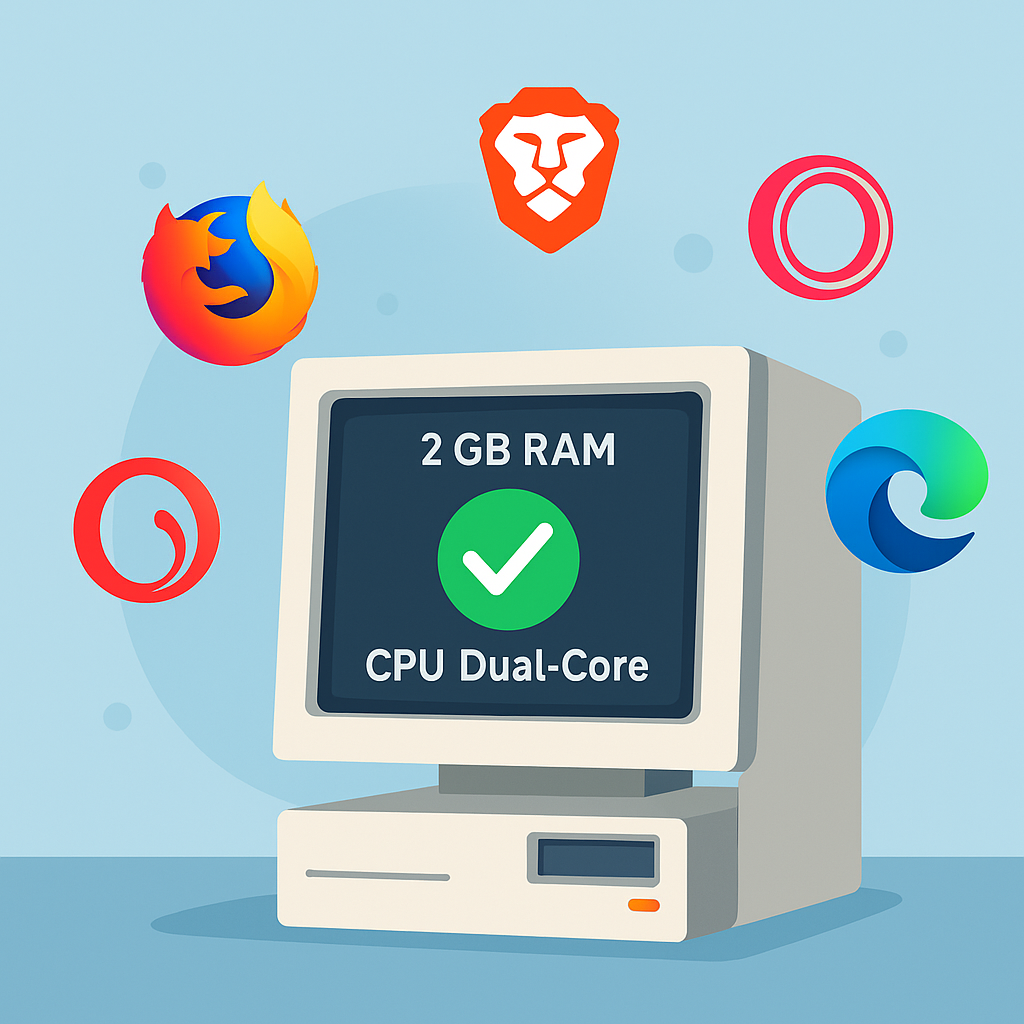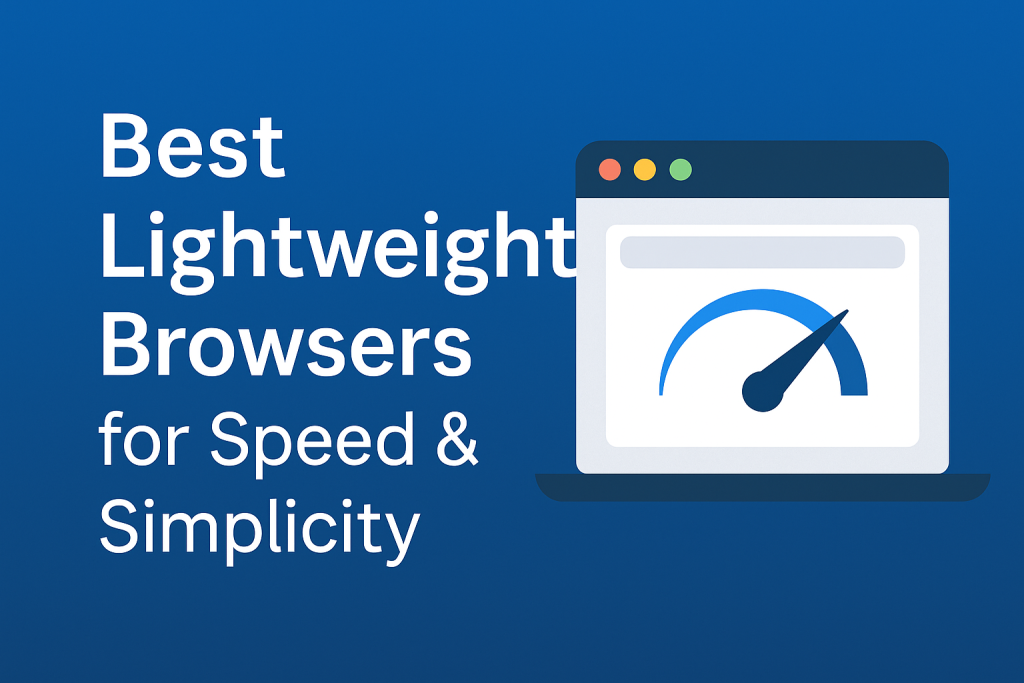Ideal Browsers for Older or Low-Spec PCs

Browsers for Low-Spec PCs: Lightweight, Fast, and Secure in 2025
If your computer is slow or aging, you still deserve a smooth web experience. Therefore, this guide to browsers for low-spec PCs explains which options feel light, why they do, and exactly how to tune them. Moreover, we include practical setup tips, essential extensions, and helpful internal resources from PM2Browser—so you can browse confidently without images or bloat.
Quick Navigation
- What Makes Browsers for Low-Spec PCs Truly Lightweight?
- Quick Picks: Best Browsers for Low-Spec PCs by Scenario
- Top Browsers for Low-Spec PCs (2025 Edition)
- Performance Tweaks for Browsers on Low-Spec PCs
- Essential Extensions (and What to Avoid)
- FAQs for Low-Spec Browsing
- Final Verdict
What Makes Browsers for Low-Spec PCs Truly Lightweight?
On older or low-spec machines—often dual-core CPUs with 2–4 GB RAM—every background task matters. Consequently, the most suitable browsers reduce RAM consumption, limit CPU wakeups, and keep disk I/O minimal. In addition, they avoid bundled shopping helpers, crypto widgets, or social sidebars that quietly drain resources. As a result, pages feel responsive even when you open multiple tabs.
- Memory efficiency: Lower per-tab footprint and faster garbage collection.
- Process control: Fewer persistent background services and balanced site isolation.
- Network sanity: Built-in tracking protection cuts unnecessary requests.
- Profile hygiene: Lean caches and occasional resets prevent creeping bloat.
In short, a tuned setup often beats a “lite fork.” Therefore, pick a mainstream engine for security updates, then configure it smartly.
Quick Picks: Best Browsers for Low-Spec PCs by Scenario
Minimal RAM Use on Low-Spec PCs
For example, Opera GX with RAM and CPU limiters can cap resource spikes. Likewise, Brave reduces memory churn by blocking ads and trackers at the network level.
Privacy-Focused Browsers for Low-Spec PCs
If privacy matters, consider Brave or Firefox. Moreover, both work well with a single efficient content blocker, so you usually need fewer extensions.
Windows Integration for Low-Spec PCs
Microsoft Edge provides Sleeping Tabs and an Efficiency mode. Therefore, inactive tabs consume less memory while the PC remains snappy.
Many Tabs on Weak CPUs
Use Opera GX for hard caps and Edge for aggressive tab sleeping. Consequently, multitasking is smoother even on older laptops

Top Browsers for Low-Spec PCs (2025 Edition)
1) Firefox – Flexible & Lightweight Browser for Low-Spec PCs
Firefox remains a reliable choice. Moreover, Enhanced Tracking Protection (Strict) and a single content blocker strike a neat balance between privacy and speed. Therefore, with limited extensions, Firefox stays light on RAM and keeps CPU usage predictable.
- Hardware acceleration toggle; process limit controls; easy profile refresh.
- Compatible with uBlock Origin from the official add-on repository.
- Reader View and Total Cookie Protection enhance usability and safety.
- Too many extensions can undermine its lightweight feel.
- Some niche sites prefer Chromium optimizations first; minor issues arise occasionally.
Next step: For practical, step-by-step tuning, see our internal guide:
Firefox Browser Guide 2025.
2) Microsoft Edge – Browser for Low-Spec PCs with Sleeping Tabs
Microsoft Edge is a smart default on Windows. For instance, Sleeping Tabs suspends inactive pages, while Efficiency mode trims background activity. As a result, your system feels responsive even when you keep multiple tabs open for research.
- Solid tracking prevention and sensible defaults.
- Good video playback performance with hardware acceleration.
- Stable on older Windows builds; integrates neatly with system decoding.
- Sidebar apps, shopping features, and “extras” can add overhead—disable what you do not need.
3) Opera GX – Best Lightweight Browser for Old or Low-End PCs
Opera GX is not just for gamers. In addition, its RAM and CPU limiters let you cap resource usage explicitly. Consequently, even with modest RAM, the browser remains responsive while background tabs hibernate quietly.
- Resource limiter, ad/tracker blocking, and tab hibernation built in.
- Customizable start page and quick toggles to remove noise.
- Disable optional feeds and side integrations to keep it truly lean.
4) Brave – Fast Browser for Low-End PCs with Strong Blocking
Brave blocks ads and trackers by default. Therefore, fewer third-party scripts run, which reduces CPU spikes and memory churn. Moreover, because you often need fewer extensions, Brave stays tidy and efficient on older hardware.
- Network-level shields; HTTPS upgrades; fingerprinting protections.
- Consistently fast page loads on content-heavy sites.
- Turn off optional extras (e.g., rewards/news) if you want a minimal setup.
5) Google Chrome – Still a Usable Browser for Low-Spec PCs (If Kept Lean)
Google Chrome offers excellent site compatibility and robust dev tools. However, it can become heavy with too many extensions. In conclusion, with a fresh profile and strict extension discipline, Chrome remains a dependable daily driver on low-spec machines.
- Fast V8 engine and top-tier compatibility.
- Great debugging tools for slow sites or network bottlenecks.
- Prone to memory bloat if you install multiple always-on utilities.
Helpful resource: Follow our lean setup checklist in
Google Chrome Guide 2025.
Performance Tweaks for Browsers on Low-Spec PCs
Thoughtful configuration multiplies performance gains. Therefore, apply the following steps in order, test after each change, and keep what actually helps your machine.
- Use one efficient content blocker. More than one causes duplicate work. For example, rely on built-in shields (Brave/Opera) or install uBlock Origin from the official store (Firefox/Edge/Chrome).
- Enable tab sleeping or hibernation. Consequently, inactive tabs free up RAM and reduce CPU load (Edge, Opera GX).
- Toggle hardware acceleration. If video or scrolling stutters, turn it off and compare. In many cases, proper GPU decoding helps substantially.
- Limit extensions to essentials. Moreover, avoid couponing/shopping add-ons that inject scripts everywhere.
- Reduce auto-playing media and push notifications. As a result, pages stop waking the CPU unnecessarily.
- Refresh bloated profiles periodically. Export bookmarks, create a clean profile, and re-install only what you need. In short, this resets hidden cruft.
- Keep one profile per role. For instance, separate “Work” and “Personal” to isolate extensions and cookies.
- Prefer Reader Mode or simplified pages. Therefore, long articles render quicker with fewer scripts.
Essential Extensions for Browsers on Low-Spec PCs (and What to Avoid)
Extensions are powerful; however, each one consumes memory and CPU. Therefore, treat them like apps on a phone—install sparingly and update regularly.
Keep These (1–3 Max) for Low-Spec PCs
- One content blocker (built-in shields or uBlock Origin).
- HTTPS-only mode and strict tracking protection (often built in).
- Lightweight password manager, unless you rely on the browser’s native manager.
Avoid These on Low-End or Old PCs
- Multiple ad blockers simultaneously.
- Heavy coupon/shopping add-ons injecting scripts across sites.
- All-in-one toolbars that poll constantly in the background.
FAQs for Browsers for Low-Spec PCs
Will ad and tracker blocking really speed up my old PC?
Yes. Because fewer scripts execute, your CPU wakes less frequently and memory churn decreases. Consequently, pages feel faster and laptops run cooler.
Is it better to keep many tabs in one window or multiple windows?
Focus on total tab count rather than window count. Moreover, enable tab sleeping so inactive pages release resources automatically.
Are “lite” forks better than mainstream browsers?
Not necessarily. In fact, mainstream engines (Chromium/Gecko) receive fast security patches and broad optimization work. Therefore, a tuned mainstream browser often wins.
What about video playback on very weak hardware?
Start with 720p and enable hardware acceleration. If stutter continues, test the opposite setting. Additionally, close background tabs and pause auto-playing media.
Do I need a separate antivirus browser extension?
Usually no. Instead, keep the OS and browser updated and rely on SmartScreen/Google Safe Browsing plus your single content blocker.
Final Verdict: Best Browsers for Low-Spec PCs
If you want a quick answer, choose Brave or Firefox for privacy-first speed; pick Opera GX when you need explicit RAM/CPU caps; and use Microsoft Edge for Windows-native features like Sleeping Tabs. Meanwhile, Google Chrome remains fine if you keep it lean. Ultimately, the biggest wins come from smart configuration: fewer extensions, sleeping tabs, and periodic profile refreshes.
Recommended reading on PM2Browser (Internal Links):
- Firefox Browser Guide 2025 — practical steps to keep Firefox light.
- Google Chrome Guide 2025 — a lean setup checklist for Chrome.
- PM2Browser Home — more performance guides and updates.

